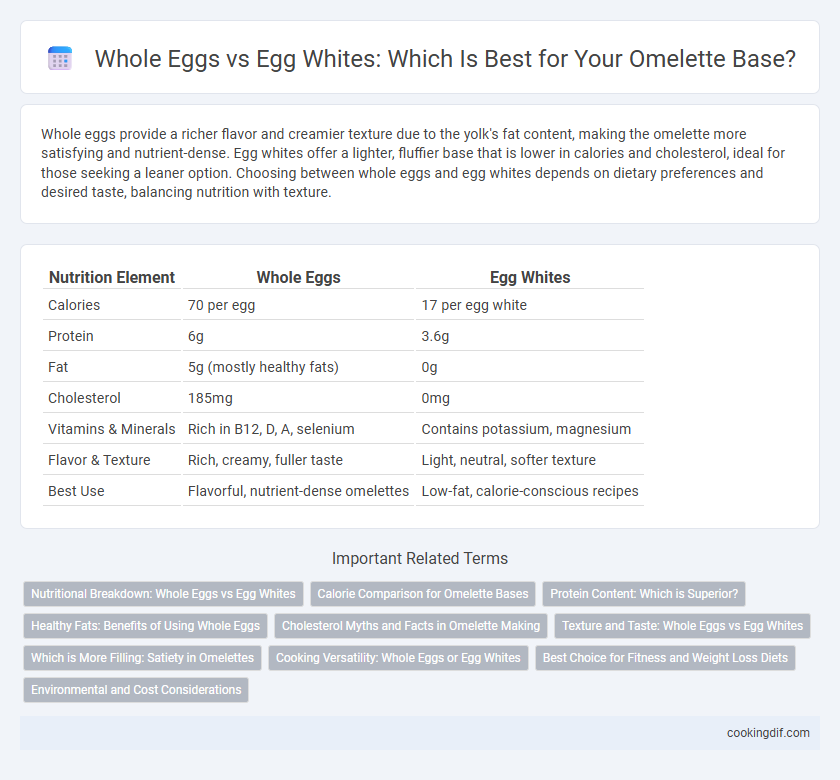Whole eggs provide a richer flavor and creamier texture due to the yolk's fat content, making the omelette more satisfying and nutrient-dense. Egg whites offer a lighter, fluffier base that is lower in calories and cholesterol, ideal for those seeking a leaner option. Choosing between whole eggs and egg whites depends on dietary preferences and desired taste, balancing nutrition with texture.
Table of Comparison
| Nutrition Element | Whole Eggs | Egg Whites |
|---|---|---|
| Calories | 70 per egg | 17 per egg white |
| Protein | 6g | 3.6g |
| Fat | 5g (mostly healthy fats) | 0g |
| Cholesterol | 185mg | 0mg |
| Vitamins & Minerals | Rich in B12, D, A, selenium | Contains potassium, magnesium |
| Flavor & Texture | Rich, creamy, fuller taste | Light, neutral, softer texture |
| Best Use | Flavorful, nutrient-dense omelettes | Low-fat, calorie-conscious recipes |
Nutritional Breakdown: Whole Eggs vs Egg Whites
Whole eggs provide a balanced nutritional profile with about 6 grams of protein, 5 grams of healthy fats, and essential vitamins like B12, D, and choline per large egg. Egg whites contain nearly all the protein of whole eggs--around 3.6 grams per egg--but are virtually fat-free and low in calories, with minimal vitamins and minerals. Choosing whole eggs offers a richer nutrient density, while egg whites are ideal for low-fat, high-protein diets.
Calorie Comparison for Omelette Bases
Whole eggs contain approximately 70 calories each, while egg whites have about 17 calories per egg, making egg whites a significantly lower-calorie option for omelette bases. Using whole eggs provides more nutrients such as healthy fats, vitamins, and minerals, but increases the overall calorie count compared to using just egg whites. Choosing egg whites helps reduce calorie intake, which can be beneficial for weight management or lower-calorie diets without sacrificing protein content.
Protein Content: Which is Superior?
Whole eggs provide a balanced source of protein with approximately 6 grams per egg, including essential amino acids and healthy fats from the yolk. Egg whites contain about 3.6 grams of pure protein per egg without any fat or cholesterol, making them a leaner option for protein intake. For muscle building and weight management, egg whites offer a higher protein-to-calorie ratio, while whole eggs deliver a more complete nutrient profile.
Healthy Fats: Benefits of Using Whole Eggs
Whole eggs provide healthy fats, including omega-3 fatty acids and monounsaturated fats, essential for brain function and heart health. These fats aid in nutrient absorption, supporting fat-soluble vitamins like A, D, E, and K during digestion. Choosing whole eggs over egg whites ensures a balanced intake of protein and beneficial fats, promoting better overall nutrition and satiety.
Cholesterol Myths and Facts in Omelette Making
Whole eggs contain dietary cholesterol, but numerous studies show they have minimal impact on blood cholesterol levels for most people. Egg whites are cholesterol-free, making them popular for heart-healthy omelettes; however, the yolk provides essential nutrients like vitamins A, D, E, and B12. Debunking cholesterol myths, it's important to note that consuming whole eggs in moderation supports balanced nutrition without significantly raising cardiovascular risk.
Texture and Taste: Whole Eggs vs Egg Whites
Whole eggs provide a richer texture and fuller taste in omelettes due to the fat content in the yolk, which adds moisture and creaminess. Egg whites create a lighter, fluffier omelette with a milder flavor, often preferred for lower calorie options but can result in a drier texture. Choosing between whole eggs and egg whites depends on whether a richer taste or a leaner, airier texture is desired.
Which is More Filling: Satiety in Omelettes
Whole eggs provide a higher satiety level in omelettes compared to egg whites due to their balanced protein, fat, and nutrient content, including essential vitamins and minerals that promote fullness. Egg whites are lower in calories and fat but lack the fat-soluble nutrients and satiety-enhancing fats that contribute to prolonged fullness. Studies show that consuming whole eggs in meals results in reduced hunger and calorie intake at subsequent meals, making them a more filling base for omelettes.
Cooking Versatility: Whole Eggs or Egg Whites
Whole eggs provide a richer flavor and better texture due to the combined protein and fat in the yolk, making them ideal for fluffy, creamy omelettes. Egg whites offer a lower-calorie, high-protein option with a lighter, more delicate texture suitable for those seeking a leaner meal. The choice between whole eggs and egg whites influences cooking versatility by balancing taste and nutritional goals, where whole eggs excel in moisture and richness, and egg whites excel in calorie control and mild flavor.
Best Choice for Fitness and Weight Loss Diets
Whole eggs provide essential nutrients like vitamins A, D, E, and B12 along with healthy fats that support muscle growth and overall health, making them a superior choice for balanced fitness diets. Egg whites offer high-quality protein with minimal calories and zero fat, ideal for weight loss plans focused on calorie control and lean muscle preservation. Choosing between whole eggs and egg whites depends on dietary goals: whole eggs fuel energy and nutrient intake, while egg whites prioritize low calorie and fat content.
Environmental and Cost Considerations
Whole eggs provide a richer nutritional profile but have a higher environmental impact due to greater resource consumption in production compared to egg whites. Egg whites are more cost-effective and generate less waste, making them an eco-friendly choice for omelette bases. Selecting egg whites can reduce carbon footprint and lower grocery expenses while still offering protein content.
Whole eggs vs egg whites for base Infographic

 cookingdif.com
cookingdif.com